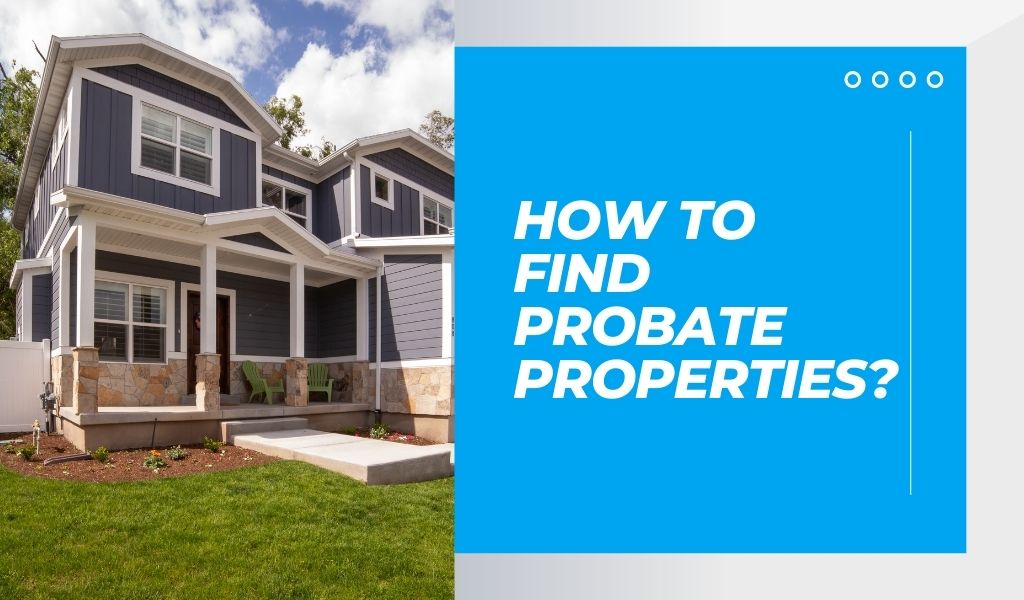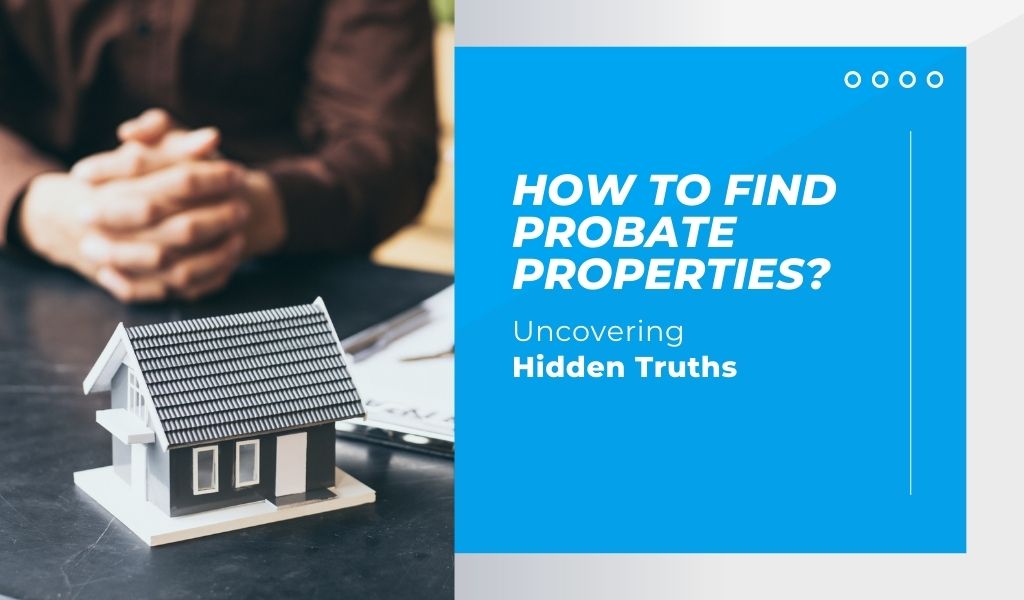Although you’ve probably heard the phrase “probate” before and have a general understanding of what it entails, most people are blissfully ignorant of its complexities. You should have a better notion of what to anticipate after reading this article should you ever have to deal with probate property. To understand how to find probate properties UK, first consider the following:

What is Probate?
Probate basically refers to the procedure of asking the court for authorisation to handle a decedent’s inheritance.
What is the Meaning of Selling a House in Probate?
To identify the legitimate heirs and resolve any outstanding bills or taxes, a deceased homeowner’s property may need to go through the probate court process. You could have to sell the residence if you’ve been chosen as the estate’s executor to transfer the assets to the beneficiaries.
The process of selling a probate property UK is unique to each situation, so it’s crucial to keep that in mind before you consider selling. You may help guarantee that the procedure goes smoothly and lawfully by working with a skilled estate agent and probate attorney.
Is it Compulsory to Sell a House after Someone Passes Away?
After someone passes away, you are not compelled to sell their property. However, if the property was owned by a deceased individual and is currently undergoing probate, it could need to be sold to settle any outstanding obligations and taxes. This will make it possible to transfer the assets to the legitimate heirs.
The home may be transferred into the names of the beneficiaries of the will. Therefore, whoever’s name has been added to the deed will have legal ownership of the property.
After the individual or organisation has transferred ownership of the property into their names, they are free to do as they wish. This includes living on the property as well as renting it out, as well as probate properties for sale.

Who is an Executor?
To carry out the deceased person’s instructions, an executor is named in their will. You’ll have a lot of obligations and responsibilities to do if someone appoints you as their executor in their will.
Particularly when handling the emotional aspect of the situation, this can be a time-consuming duty. The good news is that you can complete this journey successfully if you have the correct advice and information.
It’s crucial to communicate with the family and other parties interested in the estate, as well as to be aware of your obligations.
An executor’s responsibilities include:
- Paying inheritance tax
- Valuing the assets of the estate
- Dividing and distributing money and other assets
- Paying off debts and liabilities
- Selling the property
Initial authority to sell the property rests with the executor of the state, who must act in line with the terms of the will and any applicable legal requirements. You must be aware of all the financial and legal ramifications of the estate.
Is it Okay to Sell a House Before Probate is Granted?
No, a residence cannot be sold before probate is granted. You cannot sell a deceased person’s solely owned property unless you have been granted probate.
However, you must wait until probate is authorised before selling the house. You can list the house on the market right away.
It’s crucial to remember that it can take 12 weeks or longer for probate to be granted.
The best course of action is to seek legal counsel from a lawyer with experience in probate law to make sure you adhere to the required legal procedures to put up probate properties for sale.
Can Executors Sell Without Approval of Beneficiary?
The executor may sell the property without the beneficiaries’ consent, according to the law. However, the executor is required to act in the estate’s best interests and adhere to the terms of the will or the intestacy laws in the absence of a will.
All beneficiaries will be informed of the anticipated sale to keep them updated, even though the executor has the final say about choices regarding the sale of the property.
The executor must see to it that the property is sold for what it is worth on the open market. The beneficiaries have the right to contest the sale if they believe the house was sold for less than it was worth, and they may also ask for the executor to be fired if they believe they have acted improperly.

How to Find Probate Properties?
Even though it could seem like a massive undertaking, there are steps you can take to ensure a successful and easy process.
These steps will guide you on how to find probate properties UK:
Employ a Seasoned Real Estate Agent: A seasoned real estate agent may provide direction and help throughout the home sale process. They will work hard to showcase your home’s best qualities while marketing it to the highest standards.
Contact a Lawyer: To ensure that all legal criteria are met throughout the probate procedure, it is advised that you contact a lawyer. You might get assistance from the lawyer with the property sale as well.
Obtain a Home Valuation: To ascertain the value of the property, it is critical to obtain a home valuation. This will assist you in determining a reasonable asking price for the property based on its market value and ensure that you are not selling it for less than it is worth. The value of a property as of the date of the owner’s death can be determined using estate agent appraisals.
Get Court Approval: You’ll need to get court approval before you can sell the property. This entails submitting a petition to the probate court, along with other necessary paperwork, such as the property valuation.
Accept an Offer: You must contact the court and get permission to accept an offer once you have one on the probate property UK.
The Cost of Selling a House You've Inherited
In the UK, the costs associated with selling an inherited home might differ based on several variables.
Some of the expenses to consider include:
Probate Fees: If the estate needs to be probated, there will be a charge to apply for the grant of probate. For estates worth more than $5,000, there is now a levy of £215.
Estate Agent Fees: You will be required to pay the estate agent’s commission if you choose to use them to sell the home. These costs may differ, but they normally fall between 1% and 3% of the sale price.
Conveyancing Fees: For the legal aspects of selling the property, you will want the services of a solicitor or conveyancer. Their costs will vary depending on how complicated the sale is, but they normally cost between £500 and £1,500.
Capital Gains Tax: You might have to pay capital gains tax on any profit you make from the sale if the property’s value has risen since the owner’s death. The value of the property and your individual tax situation will determine how much tax you’ll have to pay.
Repairs and Renovations: You could have to invest money on improvements or repairs to the property, depending on its state, to increase its appeal to potential purchasers.

Preparing the Property for Sale
A probate property must be prepared for sale in numerous important ways. With the help of these methods, you can have a successful transaction without encountering any difficulties.
Perform the following steps:
Get a Grant of Probate: You must first seek a grant of probate from the court before you may sell the property. This is an official document that attests to your legitimacy in handling the estate.
Clean up the Property: Remove all clutter and the deceased’s personal effects from the premises. For this, you might need to use a professional cleaning or moving service. Clearing the property will make it easier for prospective purchasers to picture themselves residing there.
Conduct Maintenance and Repairs: Keep the property maintained and make any necessary repairs. This could involve repainting, addressing any lighting or fixture problems, and repairing any structural problems. This will lessen any worries potential buyers may have regarding the house and its general condition.
Highlight Appealing Qualities: Emphasise selling points like a spacious, contemporary living area, modern kitchen and bathrooms, a fireplace, an attic, and other features.
Staging a Property: Staging a property will increase its appeal to prospective purchasers. This can entail moving furniture and maintaining good lighting in the area.
Maintain the Tidiness: Perform a thorough cleaning and get rid of any bad odours to make sure the property is pristine and smells neutral.
Advertise the Property: To reach any prospective buyers, use a range of marketing platforms, such as web listings, regional newspapers, and estate agent networks. Selecting the most experienced estate agent is crucial because they will typically do this on your behalf.
Arrange Viewings: Plan and lead viewings of the property for potential purchasers, showcasing its greatest attributes and responding to any queries they might have.
Completion: Work with a lawyer or conveyancer to complete the sale and transfer ownership of the property after a qualified buyer has been identified.
The above steps should help you to comprehend how to find probate properties UK.
Conclusion: To Complete the Sale Quickly Adhere to the Law
It can be difficult to sell a probate property, especially if you’re the executor. However, there are several rules to help you make a good transaction, so don’t be overly afraid of the procedure.
Having an effective estate agent on your side will relieve you of a lot of stress. They will take care of finding the property’s market worth, marketing and staging it, and making sure all prospective buyers see it.
You’ll be able to concentrate on other elements of your sale and the probate procedure by having these responsibilities handled by a professional.


